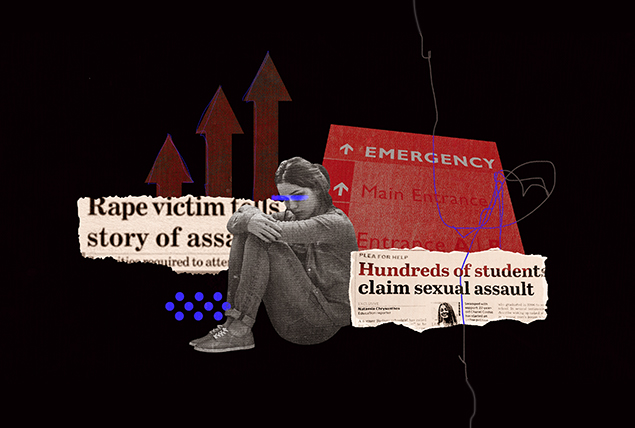Sexual Assault-Related ER Visits Are Rising, a New Study Shows

Sexual assault has a history of being underreported. In fact, according to RAINN, a national anti-sexual violence organization, only 310 out of every 1,000 sexual assaults were reported to police between 2015 and 2019 in the United States. There are a number of reasons many victims of sexual assault choose not to go to the police, the most common being fear of retaliation and a lack of belief in the police force.
These statistics are worrying because when people choose not to report sexual assault, perpetrators go free and potentially commit assaults on other victims. It also means our cultural awareness of the widespread problem of sexual assault is lacking. Finally, these statistics suggest that a large portion of people feel sexual assault is simply not worth reporting, because they fear either nothing will happen or their perpetrator will fight back.
Despite these concerning figures, a new study has shed light on how our cultural response to sexual assault may be beginning to change.
About the study
Published in October 2022 in JAMA Network Open, the study utilized data gathered from 2006 to 2019. The study found sexual assault-related visits to the emergency department increased by a staggering 1,533 percent between 2006 and 2019. The study demonstrates that more and more sexual assault survivors are seeking emergency medical care. Interestingly, visits to the ER have increased much faster than reports to the police. However, FBI-reported rapes and sexual assaults did increase dramatically between 2015 and 2019.
According to the authors of the study, the significant increase in ER visits is probably attributable to a variety of cultural shifts, including the #MeToo movement and the fallout from the Larry Nassar/USA Gymnastics sexual assault case. It seems that cultural movements are having a worldwide impact, and our collective awareness and understanding of the importance of reporting sexual assault have increased. The authors noted that population increase may have also added slightly to the number of ER visits during this period.
What do these results really mean?
According to Scott Berkowitz, president and founder of the Rape, Abuse & Incest National Network (RAINN), who spoke to NBC News about the study, the results are encouraging.
"There’s been a huge incremental change in awareness over the last couple decades, which I think #MeToo really accelerated," he said.
Emma Jackson Smith, a psychotherapist and the president of Unicorn Health Care in Washington, D.C., is also encouraged by the increase in sexual assault-related ER visits.
"When I started working with sexual assault survivors in 2013, people had a much more narrow understanding of what 'counted' as sexual assault back then," she said. "Over the years, and with the help of the internet, the rise of social media and other social movements—the women's march, #MeToo, #TimesUp and others—I think that we're seeing a more enlightened understanding of the scope and breadth of sexual assault in our culture."
While it's disheartening to see so many cases, the more people report instances of sexual assault, the better. After all, as more people feel safe and comfortable reporting sexual assault, we can fight the culture of sexual violence by bringing perpetrators to justice.
What is the future for awareness of sexual assault?
While this study is certainly promising, there's still a long way to go.
"As few as 21 percent of survivors seek medical care after SA [sexual assault], meaning that the survivors captured in this study represent a fraction of total SA-related care needs," the study authors wrote.
They suggested that one of the next steps toward improving awareness and support for sexual assault victims would be to implement more long-term care.
"Given that 95 percent of survivors are ultimately discharged from the ED [emergency department] without admission, we should consider developing outpatient or longitudinal care settings that might better serve all survivors," they wrote.
Ultimately, we must continue to offer the best standard of care for victims. As the authors summed up, "Survivors must be supported and motivated to seek the help they need, desire and deserve."


















